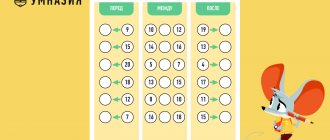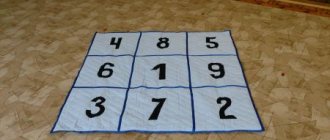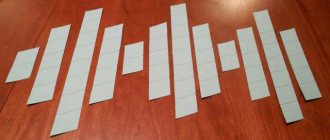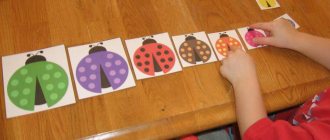Formation of elementary mathematical concepts in preschoolers through didactic games
Formation of elementary mathematical concepts through didactic games in preschool children
For the mental development of preschool children, the development of mathematical concepts, which are so necessary for understanding the world around them, is essential.
Exploring the world, the child performs various actions, as a result of which he explores, compares, establishes correspondence, counts, measures, groups, remembers, reasons and explains his actions. Mathematical concepts serve as a means of a child’s intellectual development, his cognitive and creative abilities. Visibility, consciousness, activity, accessibility and measure, scientific character and taking into account the age and individual characteristics of children, systematicity and consistency, strength of assimilation of meanings, connection between theory and practice, a variable approach, this is the content completeness that is relevant for the development of the child. The widespread use of specially educational games is important for awakening preschoolers’ interest in mathematical knowledge, improving cognitive activity, and general mental development. A didactic game is one of the forms of educational influence of an adult on a child, which has two goals, one of them is educational, which is pursued by the adult, the other is playful, for the sake of which the child acts. Play is not only pleasure and joy for a child, which in itself is very important, but with its help you can develop the child’s attention, memory, thinking, and imagination. While playing, a child can acquire new knowledge, skills, abilities, and develop abilities, sometimes without realizing it. The following tasks were identified: - Development in children of imaginative and logical thinking, mental processes (perception, attention, memory, thinking, imagination), cognitive interest in elementary mathematical concepts with the help of didactic games. — Enrich children’s vocabulary based on familiarization with the didactic game. — Create conditions that facilitate the identification and maintenance of selective interests, the emergence of independent cognitive activity in children through play. — Enrich the subject environment, creating conditions for the full education and development of students. Constant analysis of students’ achievements is a prerequisite for working with children. Diagnosis helps to determine the real picture of a child’s development, and it is possible to solve the problems of learning, development and upbringing in unity. Preschool children experience problems with temporal and spatial references, confuse colors, have difficulty grouping or comparing objects, and do not use prepositions and adverbs in speech: to the right, above, from, next to, with, about, in, on, behind. The inclusion of children in direct educational activities is slow; cognitive motivation is not sufficiently formed. Having studied this problem, we decided to overcome the identified difficulties in children with the help of didactic games. According to the Federal State Educational Standard for Additional Education, the main principle of learning is play. It is through play and project activities that the individuality of each child should develop and his interest in learning about the world should be formed. According to the Federal State Educational Standard for Educational Education, educational games allow you to solve problems in various educational areas. Didactic games greatly contribute to the development of cognitive interest in children. They make any educational material exciting, cause deep satisfaction in children, create a joyful working mood, and facilitate the process of assimilation of knowledge. For preschool children, a didactic game is study, a game for them is work, a game for them is a serious form of education. To solve the problems, didactic games can be divided into the following subgroups: - Didactic games for familiarization with numbers and teaching counting. (“One, two, count”, “Dominoes”, “How many” and others). — Didactic games for the formation of ideas about the size of objects. (“Matryoshka dolls”, “Close the doors in the houses”, “Pick up a patch”, “Find and name”, “Who lives where”). — Didactic games to familiarize yourself with the shape of objects. (“Pick by shape”, “Find an object”, “Geometric lotto”, “Applique”). — Didactic games for the formation of temporal and spatial concepts. (“Labyrinths”, “Where I’m going”, “What has changed”, “Travel”, “When it happens”, “Find the mistake”). Didactic games are perceived by children as a natural continuation of their play activities; they did not notice that learning was taking place, the children moved around the group, looked at toys, pictures, and diagrams. The games are held in an atmosphere of goodwill; a situation of success is created for each child. The main task is to include all children in the active and systematic learning of the fundamentals of mathematics. To do this, it is necessary to rely on the individual characteristics of children, their attitude to this type of activity, the level of their mathematical development and the degree of their understanding of new material. An individual approach makes it possible to ensure the active participation of all children in common work, which leads to the development of their mental abilities, attention, and prevents passivity in some children. Not only educational, but also educational tasks are carried out. Didactic games with a wide range of visual aids are used (cards, emblems, geometric shapes, counting sticks, handouts). The attractiveness of visual aids, the widespread use of gaming exercises and didactic games - all this creates a good emotional mood in children. Games with counting sticks are offered, for example, “Making geometric shapes from counting sticks.” We introduce children to the ways of building, joining and rebuilding one form from another. By working with sticks, children are able to imagine possible spatial and quantitative changes. The game “Who can collect it most quickly” is used to consolidate knowledge of objects in ascending or descending order. To develop logical thinking and attention, play the game “What’s missing?”, “What’s the count?” In the didactic game “Like - Not Like”, children notice the signs of objects by color, shape, size, material; observation, thinking, speech develops. Spatial representations are constantly expanded and consolidated in the process of all types of activities. Children navigate in specially created spatial situations and determine their place according to a given condition, perform the tasks “stand to the right of the chair”, “stand so that there is a chair behind and a table in front.” To consolidate knowledge about spatial orientations, the didactic game “What has changed?” is used. Children also reinforce their spatial orientation in the game “Where will you go and what will you find”, “The Bunny’s Journey”. To achieve a better result, didactic games are carried out with the appearance of a fairy-tale hero. For example, the game “Find the Treasure,” where we go in search of treasure on a pirate ship; “In the Thirtieth State” we travel with Ivan the Tsarevich. In preschool age, children develop the elements of logical thinking. In order to develop children's ability to reason and make their own conclusions, games such as “Associations”, “Guess what they wished for”, “Help the cat get to the mouse”, and others are used. In our work, we use mathematical riddles with great pleasure. They provide invaluable assistance in developing independent thinking and the ability to prove the correctness of their judgments. We solve these wonderful riddles every day, relying on a card index of such tasks. Children really like to write riddles and problems themselves, and at the same time they perform complex mental operations. Children are also offered geometric figures to create planar images of objects, animals, and birds. Children are happy with their results and strive to do tasks even better. As a result, children began to cope better with all tasks and use prepositions and adverbs in their speech. For example, during morning exercises (counting exercises, spatial orientation), while walking (running, walking in a certain direction, classification, sizes, size and color), in work activities (table setting, preparing for classes), in role-playing games games (“Guests” - the ratio of guests and dishes, treats). The subject-developmental environment according to the Federal State Educational Standard for Preschool Education is defined as a system of material objects of a child’s activity that functionally models the content of his spiritual and physical development. In the creativity corner, sets of geometric shapes of different colors and different sizes are presented, from which children lay out patterns, coloring pages with numbers and geometric shapes. In the building games corner there is a sufficient amount of material for playing with children's buildings, which helps to consolidate ideas about size and shape. At the center of manipulative games there is a large number of didactic games with mathematical content, puzzle games, construction sets with small parts, construction toys, various measuring objects, games for attention, since we believe that an important condition for the effectiveness of teaching mathematics is the attention and perseverance of children. Board-printed, didactic games with mathematical content, various counting materials, helped children learn to select, combine, count, classify objects, and invent their own games. Thus, each child can try out their abilities, hobbies, and participate in collective mini-groups. We have the opportunity to organize independent and joint activities of children, develop their ability to experiment, search and find solutions. Children's experimentation is widely used as a teaching method . Children gain new knowledge and draw conclusions by observing the process itself. Experimental research develops curiosity and activates the child’s cognitive activity. Our role is to puzzle, include in search activities and increase the share of independence. All elementary experiments are carried out in an exciting way: work in a “magic laboratory”, meeting with a “fairy”. By playing with sand, water and natural materials, children developed their creative abilities and expanded their scientific and natural-mathematical understanding. We actively use various forms of physical activity to strengthen the physical and psychological health of children. During the day, preventive activities are carried out: morning exercises, outdoor exercises, sports games, finger exercises, physical exercises, walks, sports leisure activities, where children consolidate and master various mathematical concepts, learn to measure length, direction of movements, and understand instructions for spatial operations. To develop mathematical concepts, various mathematical entertainments are held: “New Teremok”, “Visiting a Fairy Tale”. All entertainment is based on gaming types of cognitive activity and the use of information and entertainment content. During the entertainment, children show intelligence, resourcefulness, the ability to work in one team, and coordinate speech with movements. We came to the conclusion that the inclusion of didactic games and exercises with mathematical content in various types of children’s activities (joint, independent, routine moments) made it possible to increase their cognitive activity and mathematical concepts. The place of the didactic game in the structure of classes on the formation of elementary mathematical concepts is determined by the age of the children, the purpose, purpose and content of the lesson. Thanks to the widespread use of educational didactic games in regulated and unregulated forms of work, children acquired mathematical knowledge and skills without overload and tedious activities. Children developed a keen interest in the process of cognition, they became more developed in the ability to think independently, in the ability to prove the correctness of judgments, general mental abilities, logic of thought, reasoning and action, flexibility of the thought process, ingenuity and ingenuity, and spatial concepts were developed and improved. With the help of didactic games, it is possible to concentrate the attention and arouse interest of even the most disorganized preschool children. During the game, children successfully master complex mathematical concepts, count, classify, and group. Our main goal is to raise children healthy, able to think, make independent decisions, and develop mental processes, which is the basis for successful schooling.
We recommend watching:
Didactic games - coloring pages to strengthen counting skills for children 3-5 years old Game technologies in kindergarten Game therapy for preschoolers Work experience as a preschool teacher. Role-playing games
Similar articles:
Methods for early teaching children mathematics
Games for teaching mathematics to children 3-6 years old
Poems for teaching children to count
Math problems games for preschoolers
Logic games in mathematics for preschoolers
Development of mathematical abilities through didactic gamesconsultation
Consultation for parents.
Development of mathematical abilities through didactic games.
In preschool age, play is of utmost importance in the life of a small child. The need for play in children continues and occupies a significant place even during the first years of their schooling. In games there is no real conditioning by circumstances, space, time. Children are the creators of the present and the future. This is the charm of the game.
Have you heard the following parable: “I tried to reach the child’s heart with words, but they often passed by him unheard. I tried to reach his heart with books, he gave me puzzled looks. In despair, I turned away from him. “How can I get to this child’s heart? “I exclaimed. He whispered in my ear: “Come play with me!” »
Learn by playing! In order for young children to master the necessary movements, speech, and various skills, they must be taught this.
Didactic games were created to teach children. Their main feature is that the task is presented to the child in a playful way. Children play without suspecting that they are mastering some knowledge, mastering the skills of operating with certain objects, and learning a culture of communication with each other. Any didactic game contains cognitive and educational game components and game actions. The selection of didactic games for teaching children mathematics is carried out in accordance with program requirements. Each didactic game should be aimed at solving a particular educational problem. The didactic game only partly meets the requirements of a complete systematic knowledge: sometimes it is an “explosion of surprise” for children from the perception of something new, unknown; sometimes the game is “search and discovery”, and always the game is joy, the children’s path to their dreams. Filling learning with emotional and cognitive content is a feature of the didactic game.
Mathematics plays a huge role in mental education and in the development of a child’s intelligence. Currently, in the era of the computer revolution, the common point of view expressed in the words: “Not everyone will be a mathematician” is hopelessly outdated. We must remember that mathematics is one of the most difficult academic subjects. Therefore, one of the most important tasks of educators and parents is to develop a child’s interest in mathematics in preschool age. Introducing this subject in a playful and entertaining way will help the child in the future to master the school curriculum faster and easier. Mathematics has a unique developmental effect. Its study contributes to the development of memory, speech, imagination, emotions; forms perseverance, patience, and creative potential of the individual. A “mathematician” plans his activities better, predicts the situation, expresses his thoughts more consistently and accurately, and can clearly justify his position.
Parents think that kindergarten is not such an important event in their children’s lives. Many parents believe that the main thing when preparing for school is to introduce the child to numbers and teach him to write, count, add and subtract. The stock of memorized knowledge ends very quickly, and the lack of formation of one’s own ability to think productively (that is, to independently perform the above-mentioned mental actions on mathematical content) very quickly leads to the appearance of “problems with mathematics.” Children, regardless of age, are involved in solving simple creative problems: finding, guessing, revealing a secret, composing, modifying, matching, modeling, grouping, expressing mathematical relationships and dependencies in any available way. Children develop the ability to find the answer to the constant question: “how?” One of the important directions in solving this problem is the creation of conditions that ensure the full mental development of children, associated with the formation of stable cognitive interests, abilities and skills of mental activity, mental qualities, creative initiative and independence.
With the help of didactic games, the teacher teaches children to think independently and use the acquired knowledge in various conditions in accordance with the task. A didactic game allows you to individualize work, give tasks that are feasible for each child, taking into account his mental and psychophysical capabilities, and maximize the development of each child’s abilities. The child’s attention is focused on the game, on completing game tasks, and meanwhile he overcomes difficulties of a mathematical nature, transfers his existing knowledge to a new environment.
Thus, didactic games make it possible to provide the required number of repetitions on a variety of material, constantly supporting and maintaining a positive attitude towards the mathematical task, which is embedded in the content of the game.
When using didactic games, various objects and visual material are widely used, which helps ensure that classes are held in a fun, entertaining and accessible way.
Didactic games for the formation of mathematical concepts are conventionally divided into the following groups:
1. Games with numbers and numbers
2. Time travel games
3. Space navigation games
4. Games with geometric shapes
5. Logical thinking games
These games can be presented in different forms, be it printed board games, verbal games (assignments, riddles, conversations, sentences), or plot games.
When using didactic games, I use a variety of objects and visual material, which helps ensure that the lessons are fun, entertaining and accessible. To form elementary mathematical concepts in preschoolers, I use various types of didactic games, for example:
1. Games with objects: “Assemble a pyramid”, “Assemble a matryoshka doll”, “Build a turret”, etc. The purpose of these games is to help consolidate the qualities of objects (size, shape, color).
2. Games for sensory development:
- to fix the color of an object: “Multi-colored beads”, “Put a bouquet in a vase”, “Let’s treat the bear with a berry”, etc. By playing these games, children learn to group and correlate objects by color.
- to fix the shape of an object: “Assemble a pyramid? ”, “Circle, Square”, “Patches for the rug”, “Mand your pants”, etc. In these games, children learn to distinguish, group objects by shape, and insert objects of a given shape into the holes corresponding to them.
- to consolidate the size of an object: “Big and small”, “Which ball is bigger”, “Let’s treat the bear”, etc. These games teach children to distinguish, alternate, and group objects by size.
The development of children's cognitive activity, their curiosity, and the desire for independent search is one of the main tasks in the development of a preschool child. Experience working with children of senior and junior preschool age shows that with the correct, systematic and creative use of didactic games with mathematical content and universal didactic material, significant progress in the development of cognitive activity can be achieved.
In my opinion, didactic games with mathematical content are of great importance for the successful involvement of a child in serious educational activities, for a better understanding and consolidation of mathematical material, for the development of cognitive activity in children




